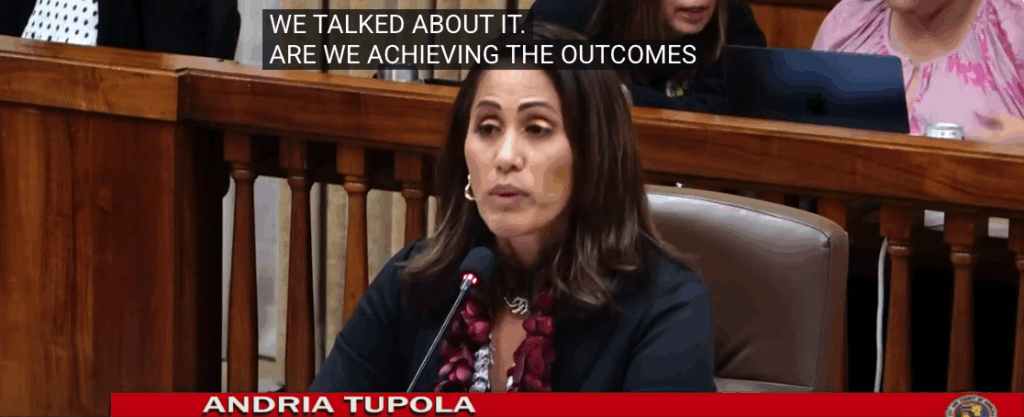A Honolulu program started during the pandemic was supposed to send teams including social workers alongside EMTs to 911 calls for non-violent incidents involving people who are homeless.
Instead, the Crisis, Outreach, Response and Engagement program has no social workers on staff and even its backers say it has become more of a medical triage unit.
“They kind of became like this vigilante team that went out and provided bandages and medical support,” said Council Vice Chair Andria Tupola, whose district includes the largest homeless population on Oʻahu.
Tupola is one of a group of people who say the original goals of the program have fallen by the wayside and it’s unclear that it is really addressing mental health crises and steering people into services. She successfully advocated for an audit of the program, CORE, before it is allowed to grow any larger.
A year ago, the program added a repurposed city bus to deliver services and in May the city’s emergency services department purchased two new ambulances for it.
“I really don’t think we should be expanding it until we know if it’s effectively working,” Tupola told Civil Beat. She and council member Val Okimoto introduced the resolution the council approved on Sept. 3 to compel the audit.
Former staff members of the program testified in support of the audit, saying it had strayed from its original mission to help people in a crisis and get them off the street toward more of a focus on providing basic medical services.
“There was some priority on the continuum of care and working with other agencies and really having those wraparound services within our program,” Jenny Neal, a social worker and former CORE field supervisor, told Civil Beat.
Over the roughly 18 months she worked at CORE, Neal said, the program’s leadership transitioned from social workers to paramedics, which shifted the direction of the program.
“They’re paramedics, and that’s just not their training and their skill set, and they truly just didn’t even prioritize or understand the importance of it.”
Jenny Neal, former CORE field supervisor
“It just seemed like they just didn’t have the knowledge needed to fulfill that part of the program, unfortunately,” said Neal, who left CORE in April 2024. “They’re paramedics, and that’s just not their training and their skill set, and they truly just didn’t even prioritize or understand the importance of it.”
The program currently employs three nurses, 12 EMTs and 11 community health workers, said Shayne Enright, spokesperson for the Honolulu Emergency Services Department, in which CORE is housed. Community health workers are trained and certified to provide outreach services but do not have the advanced clinical training of social workers.
Jim Ireland, director of the Emergency Services Department, agreed Wednesday to an interview but then was not available Thursday, Enright said.
Ireland came under fire during his reappointment process last year from department employees who said he practiced favoritism and retaliated against those who spoke out, contributing to staffing problems, including at CORE.
Meant To Divert Emergency Calls
CORE launched in October 2021. It was initially supported by $5 million in federal pandemic relief funds, Ireland said at the time. The program was meant to divert nonviolent, homeless-related emergency calls from the Honolulu Police Department and Emergency Medical Services.
Teams of social workers and EMTs were to respond to 911 calls, mitigate crises, and steer people toward services and hopefully get them off the street.
In 2024, CORE directed 125 people into temporary shelter or behavioral treatment facilities, according to data the city provided to Civil Beat. The program has a $2.7 million annual budget and is paid for through the city’s general fund, Enright said.
Tupola said her concerns about the program include that it is now relying on EMTs who can provide medical treatment but cannot deliver the full range of social services and referrals. That is also diverting the EMTs from other calls where they might be more needed, she said.

“I don’t believe the model that we’re using right now is as effective,” she said.
Public safety and civil rights organizations also supported the audit.
CORE “appears to consistently fail to refer individuals in crisis to local community organizations for assistance. CORE’s social workers lack practical experience and established relationships in the community,” Josh Frost, policy advocate at ACLU Hawaiʻi, said in written testimony.
The Reimagining Public Safety Hawaiʻi Coalition in its testimony said the program lacks transparency because it doesn’t provide current data about who it has served and how. The coalition also said CORE is not operating as intended or following the lead of established programs that have proven results.
As a model to follow, the coalition and others who weighed in cited CAHOOTS, a program in Oregon that has gained national recognition for its method of responding to emergency calls with specially trained social workers and medics to help people in mental health-related crises.
Those who advocated for the audit said it should be used to strengthen CORE, not tear it down.
“We wouldn’t want this to be a bash CORE moment,” Neal said. “It would be a ‘Can we grow from here and better these things because our community needs it.’”
Tupola said it’s not clear yet what that might look like.
“It might have to operate very collaboratively, which means that it doesn’t exist as a solo entity anymore,” she said. “It probably could exist as a piece of a broader puzzle that addresses (homelessness) with medical, social work, law enforcement.”
Changes won’t likely be coming soon: The Office of the City Auditor has one year to complete the CORE audit.
Civil Beat’s reporting on economic inequality is supported by the Hawaiʻi Community Foundation as part of its work to build equity for all through the CHANGE Framework; and by the Cooke Foundation.


